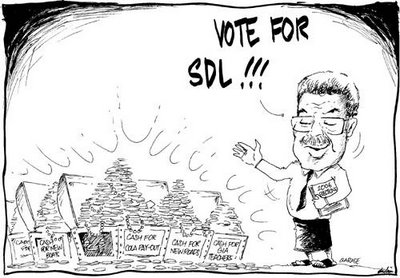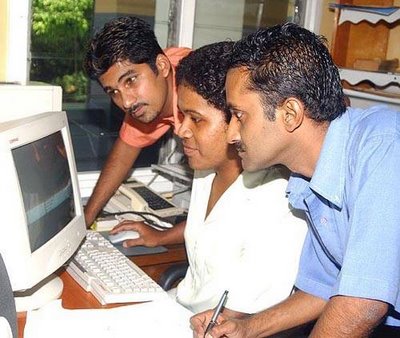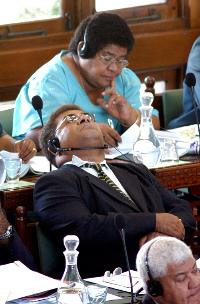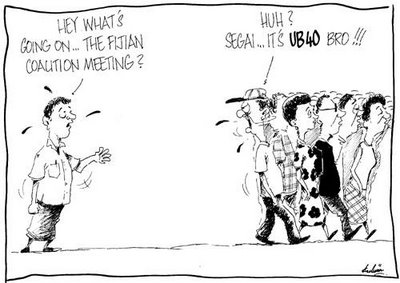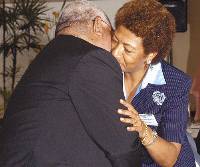S.D.L party is firing out
letters of protest left
right and center,
in retaliation for the Army's campaign of Truth.
S.I.F.M does not believe that this is inteference. The Army's action only levels the playing field and provides much needed
counter-point to all the lip-service and unethically vote-buying tactics employed by S.D.L.
The
S.D.L rebuttal that, insinuates inappropiate use of public funds does not hold water simply because the Military administers their own budget at their discretion and secondly the Cabinet Minister's
routine visit to Fijian
rural villages prior to the elections, makes them guilty of the same offence.
The concept of 'Free and Fair elections' is
not threatened by the Army as touted by critics. Rather, the
real threats in Fiji are: rushed voter registration and flawed provincial rolls.
Fiji Sun Editorial echoes the cynics and expnds on the issue of the 'Army factor' during 2006 election campaigning.
Tuesday 14th March, 2006
The military factor
Whether or not the military can use the public's money to join an election campaign is a question that will probably be decided - if ever - by the courts.
For it remains to be seen whether the Government will follow through on its threat to seek an injunction. To do so it would have to show reasonable grounds for believing that the army's action was in fact illegal. At the same time, the courts in Fiji have historically been unwilling to grant open ended injunctions. So it might be difficult for the Government to obtain an injunction restraining the army from campaigning until the matter is decided by the court at some date well into the future.
The more immediate question for the Government, however, might be the impact the army campaign is likely to have on people's voting intentions. For the military is campaigning without standing for election. It cannot ask people to vote for it. It can only suggest that people in some vague way do the right thing, hear the voice of truth and justice, denounce the liars and their lies.
It all sounds very grand, but as any experienced political campaigner will testify, voters look for parties and individuals, not institutions, to vote for (or against) at election time. It's difficult to see that the army's campaign - legal or otherwise - will have a significant effect, though the Government might argue that any effect at all could be significant given the volatility of the electorate. The Government's immediate problem is more political than legal.
By overreacting to the army's initiative, might it not lend credence to the military campaign? Could people begin to think that there may be something to hide? These are not easy questions to answer. The May election is critical for Fiji's future. It is all the more understandable, then, that the Government should resent what it sees as illegal interference by the army and its commander in the sense that it is using public funds for political ends. There's no doubt that the military's action represents a division of focus that the Government can well do without at the this stage of its campaign. But whether it will result in significantly altered voting intentions seems unlikely.
In fact the opposite may well be the case. There is widespread unease over the army's intervention in the election campaign. Even those who agree with what the commander has to say feel aggrieved that he has entered the political arena. So while he will no doubt attract a headline or two, his political impact may be much less than he would like. The Government might do better, then, to conduct its own campaign rather than worry about someone else's.
The failure of Government native ministry like the archaic Fijian Affairs Board is now
being echoed in Fiji Senate.
The Lau Provincial seat which Prime Minister Laisenia Qarase intends to contest will surely be a cracker. Firstly he has
serious competition to consider, as well as the wounds relating to the 2000 coup and the Paramount chief of Lau, the late Ratu Kamisese Mara's family of influence.
There is a ground swell of criticism, against the sacking of beloved Announcer; Sitiveni Ratulala for interviewing the Army Commander. Dismissal for violation of editorial content is excessive for such a reknown talent. This action reeks of political retalition and chained freedom of
Radio Fiji.
Mr. Ratulala is well remembered for his morning show, when he would greet listeners literally using, the whole spectrum of Fijian dialects. There are 14 Provinces of Fiji. Province is actually a broad catergory and some provinces could have 2-3 different dialects.
Freedom of Media in Fiji is limited to those who own one.
Druavesi warns FBCL
Fiji Broadcasting Corporation chief executive officer Francis Herman should come out publicly on who gave him the directive to sack popular Fijian talk back show host Sitiveni Raturala. Soqosoqo Ni Vakavulewa Ni Taukei Party secretary Ema Druavesi yesterday warned Mr Herman to be careful, as he had been used to fire a Fijian, who had a huge following in the Fijian community for many years. “The Fijian community is not happy with the actions of the FBCL,” she said. “Mr Raturala’s talkback show has a huge following throughout the country and now the Fijian people are not happy. There was nothing wrong in his interview with the army commander. Actually, it was well received by the Fijian community because they now have heard straight from the horse’s mouth.
“Mr Herman should be careful not to be caught in the web because the Fijian people will see him as a villain even though he is innocent since he is acting on higher orders to safeguard his job as well.” Ms Druavesi said the Government should appreciate the fact that it was through Mr Raturala’s popularity and ways of conducting his talkback shows that had helped the FBCL stay afloat.
Mr Herman said the FBCL’s editorial policies like all other independent and credible news organisations, reiterated their strong commitment to promoting and upholding the free flow of information, the principles of democracy and respect for human rights.
“It also demands objectivity, balance, impartiality and requires that we maintain a high degree of balance, fair play and justice in all our broadcasts,” he said. However, Ms Druavesi said Mr Herman may have his reasons but the Fijian community did not see that. “Mr Herman should come out publicly whether the directive came from the Prime Minister’s Office but if he refuses he should not blame anyone because now he has been used,” she said. Ms Druavesi said the FBCL for its survival should apologise to Mr Raturala and reinstate him before it lost its Fijian listeners.
Club Em Designs



